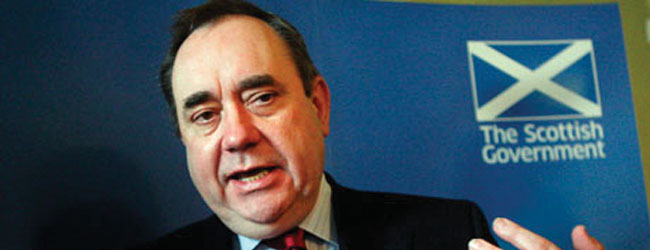6 February 2012
Power of Scotland
THE SCOTTISH INDEPENDENCE REFERENDUM | A QUESTION OF FREEDOM
BY MARY STEPHENS IN GLASGOW
- Alex Salmond, SNP leader
THE issue of a referendum over Scottish independence has fired a debate not just the length and breadth of Scotland but right through the Westminster Parliament and beyond.
The prospect of a poll follows the Scottish Parliament elections in 2011, which saw the Scottish National Party (SNP) win a majority, with a clear manifesto commitment to hold a referendum. The debate has risen sharply, not least because of Tory Prime Minister David Cameron’s intervention on the timing and nature of the referendum and the response to it. This growing debate on independence, and the future of the British and ‘UK’ state, is dominating politics in Scotland and impacting more widely.
The Tories’ and Westminster Government’s push for a swift poll with a simple ‘for or against’ vote was widely seen as a tactic (based on present polls) for a rapid rejection of independence to essentially put the question to bed. The Labour Party leadership in Scotland agrees with this. The SNP Government is insisting on a 2014 poll, allowing a longer run-in to the debate, coinciding with the Commonwealth Games being hosted in Glasgow and the 700th anniversary of the Battle of Bannockburn. Importantly, there is an emerging argument in Scotland and in the SNP for a third question on the ballot, the so-called ‘devo-max’ option, to allow greater devolution.
Recent opinion polls in Scotland put support for independence between 30% and 40%. For example an ICM survey for The Sunday Telegraph (16 January) showed 40% approval for independence and 43% disapproving. On the independence poll’s timing, 43% said as soon as possible while 41 per cent preferred 2014. Some 41% thought Scotland would be worse off and 38% thought it would be better off, reflecting what will be the core of the argument in the debate.
When broken into the three options (including ‘devo-max’), those backing full independence was 26%, those backing greater tax and spending controls 26% and those opting for the status quo 37%.
Similarly, a YouGov/Channel 4 poll (16 Jan) showed 39% for independence and 61% against. The poll showed 58% in favour of significant devolution, with 42% against.
Polls suggest that, at present, whilst an independence question might lose, a ‘devo-max’ option could win, especially for a Scottish Parliament perceived to be putting Scottish interests first, in the context of Tory/LibDem-imposed cuts from Westminster. More powers would be a greater defence against this. In this context it is perplexing that Labour’s leadership appear opposed to putting the ‘devo-max’ option even though this is nearest to its own policy. Cameron’s hugely misjudged intervention on demanding a rapid poll reflects a fear (and the SNP’s likely judgement) that the longer the debate goes on, and the deeper the Tory austerity measures bite, the more support for independence is likely to grow. Certainly holding a referendum in autumn 2014, which will be prior to the next Westminster general election in 2015, will allow the Scottish Government to distance itself clearly from the Tory/LibDem coalition.
The SNP Government is insisting on a 2014 poll, allowing a longer run-in to the debate, coinciding with the Commonwealth Games being hosted in Glasgow and the 700th anniversary of the Battle of Bannockburn
Since the establishment of the Scottish Parliament, Labour has fallen 10% and there is a view that Labour’s tactics in recent years of focusing fire on the SNP rather than the Tories, and allying with the Tories and LibDems in support of the Union, has alienated some voters who see the SNP as championing Scotland’s interests more strongly. The SNP held minority government in Scotland from 2007 to 2011 and were seen to speak up for many of the policies previously championed by Labour: defending free personal care for the elderly, introducing free prescriptions, extending the living wage , and negotiating with trade unions on policies of no compulsory redundancies in the Civil Service. Although policies were also pursued which benefit business interests, the SNP in the 2011 elections clearly took ground from Labour’s traditional supporters. Some opinion polls show higher support for independence among the most working-class and least-well-off sections of the electorate (and younger people). Labour voters are also more in favour of ‘devo-max’, with 59% in favour, 41% against (YouGov poll).
Evidently the question of Scotland’s constitutional future throws up questions for Ireland. One, possibly unintended, consequence of the public spotlight on this issue has been the re-emergence of the fact that within the Good Friday Agreement lies the provision for a ‘border poll’ referendum, which would allow for the transition to a reunified Ireland if the majority in the Six Counties want it.
As we go to press, the Scottish Parliament is about to publish its consultation paper and the debate is set to continue. Recent developments are being watched closely by many people in Ireland, with differing views on both this issue and on Ireland’s future. Martin McGuinness concisely summed up the Sinn Féin position when he restated that “it is for the people of Scotland alone to decide and vote on their country’s future”.
Follow us on Facebook
An Phoblacht on Twitter
Uncomfortable Conversations

An initiative for dialogue
for reconciliation
— — — — — — —
Contributions from key figures in the churches, academia and wider civic society as well as senior republican figures





